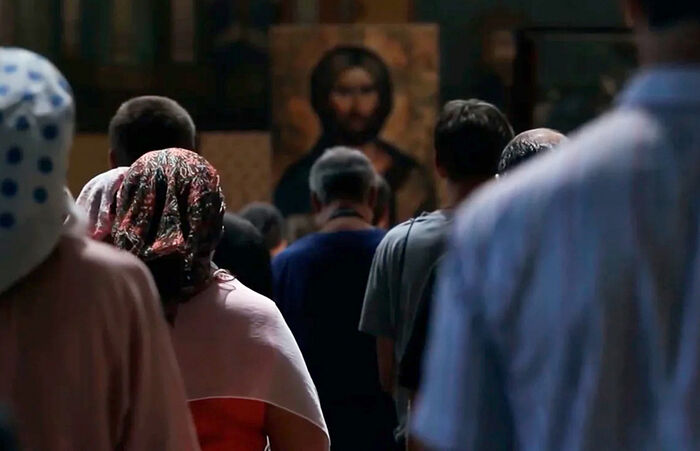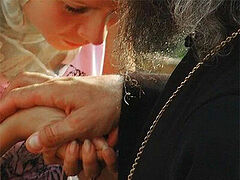There are a number of ways to be persuaded that the sin of judgment will harm your soul. One journalist friend I know says that his own talkativeness led him to this terrible but necessary conviction.
During one of his journalistic investigations, he came up against some extremely unpleasant facts from the life and activities of certain representatives of a certain diocese.
“A repulsive thing, sickening facts,” he said, “and they made me so indignant that, ignoring the apostle’s simple instructions not to “judge by appearances” (cf. 1 Cor. 6), I started cracking at all the outrageous things I discovered on every corner, with every group of people I found myself in. And I very quickly found myself in a group of people who—no, not with understanding or compassion but with a sort of wild interest not only heard out my cathartic revelations, but even egged me on, pouring oil on my fiery speeches about how bad our priests-bishops-monks are. Mockery of the Church has always been one of this group’s favorite themes at their get-togethers. A contemptuous and condescending view of ‘that ROC’, tales about ‘priests’, outrageous ‘acts’, ‘Moët & Chandon’, caviar… Everything was welcome—from Bolshevik agitprop to rumors, gossip, and the half-truths of ‘leading journalists’, of our time. Considering myself one of those very ‘leading journalists’ allowed into this circle of the chosen, I lost all control. What kind of “let not the sun go down on your anger” (Eph. 4:26)? I pulled all the stops! I rattled on and on. Although, I repeat, the facts were horrifying. Well, at the end of my speech, one representative of this society in which I had been talking came up to me, and smiling carnivorously said, “It’s good that you’re now ours. What do you think of coming to work for us? Steady pay, honoraria, hmm, a bit higher than at your little newspaper.” Not even a carnivorous smile, it was a soul-devouring sort of smile. I looked into his eyes—such hatred, such sepulchral coldness, such an infernal fire from the abyss, that I shuddered. I shuddered and apparently, came to my senses. I reeled back. ‘What do you mean, “one of yours”? I asked. ‘Ours, to be sure. Don’t worry. Come and work for us, I’ll put in a word.’
How could I not be worried when I felt in my guts that the ‘entrance ticket’ into this circle of the chosen is: betrayal—which despite all your struggles for justice pulls you into places absolutely unresembling heavenly tabernacles. Further it was like the story about the priest who doubted in the existence of demons and then felt that this non-existence was right next to him in his home, and bashing the window with his head, flew out to the street with the window frame still around his neck. That is how it was with me: I collected my dictaphones and other things and fled that gathering of ‘celebrities’. In my soul was the abomination of desolation and a horrible despondency. Shame is not smoke, but I have eyes—though I physically couldn’t raise them to heaven. I was ‘fighting for justice’…”
He wandered in that state for some time. A state that was probably very akin to the abandonment, fear, and shame of the apostle Peter. He asked Christ to free him from it—he had all too clearly understood that he had come in contact with hell. Apparently fear of this kind is beneficial. The same method works for alcoholics—in order stop drinking, a person first has to experience horror from drunkenness—that’s much more accessible.
But God has His own ways of teaching a lesson and bringing one out of a crisis. You’re a journalist? Then here’s a job for you at the war zone, my friend. That is how my acquaintance ended up in a frontline city, where they can hear explosions, drones are flying, and a few kilometers away, Christians are killing each other. The “children’s” section of the cemetery. A very young girl says,
“The worst thing about all this is when you buy a new dress, you’re walking around so pretty, and then the shelling starts. And you understand that if you don’t throw yourself to the ground right now, there’s a good change that you’ll end up in this lot tomorrow. Eh, they’ve ruined my dress. Oh alright, I’ll buy a new one if I have the money.”
Or young guy, around twenty years old, who runs out of the café without thinking in order to give first aid and bring around a wounded woman. “It’s the usual thing, what’s so big about it?” Or, a road policeman who stops the car and tells you to take off your safety belt. “Are you crazy? If the shelling starts you’ll have to jump out of here immediately and not fuss with your safety belt! No this ‘peacenik’ has completely lost his mind.” It’s like, there’s a war going on, but he saw so much kindness and compassion in people—though no less grief and despair.
There are several churches in the frontline town. It’s ancestor Saturday. “I stood there,” he said, “at the pannikhida, and the church was filled with people. Many with crutches, some with bandages and casts. And can you imagine, there’s not a whisper, no discussion. Total silence—only prayer. Everyone is praying for their dead. As I understood it, the dead on both sides. Many are weeping—not forced tears to fit the occasion, but tears of suffering. I haven’t prayed like that for a long time. After the service, the parishioners stood there discussing their own affairs. You know what never came up in their conversations? Yes, you’re right—condemnation. These people have no time for that—they’ve understood through blood that there are more important matters. Prayer for the rest of a family member’s soul, for example. Let God Himself sort it out with these “bad ones”—you would do well to make sure you’re good. And God, as practice shows, does a fine job of sorting it out. It’s strange,” he says, “but apparently in order to understand very simple things, we have to go through terrible trials, pain, and suffering. Apparently, this pain and suffering are the consequence of what the apostle Timothy wrote about:
This charge I commit unto thee, son Timothy, according to the prophecies which went before on thee, that thou by them mightest war a good warfare; Holding faith, and a good conscience; which some having put away concerning faith have made shipwreck: Of whom is Hymenaeus and Alexander; whom I have delivered unto Satan, that they may learn not to blaspheme (1 Tim. 1:18–20).
“All we need to do is not abandon faith and a good conscience. “All we need”… Good conscience—that means also not judging. I really don’t want to repeat the experience of Hymenaeus and Alexander, honestly.”
My colleague was pronounced an outcast by the “celebrities”. They no longer invite him to meetings dedicated to exposing “that ROC”.
“He’s lost his mind,” they say. “He’s not ours.”
“And thank God for that,” replies my colleague.




